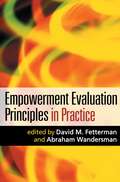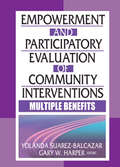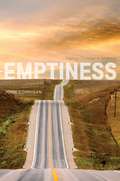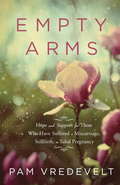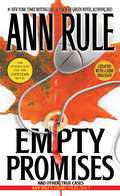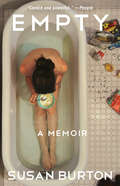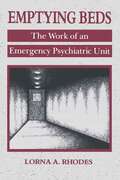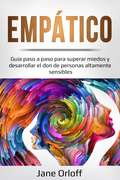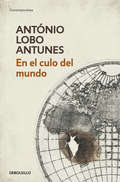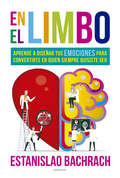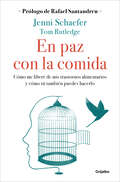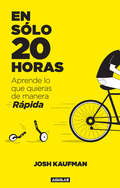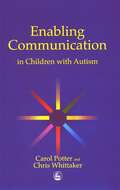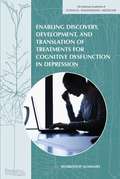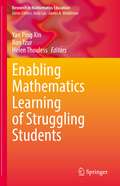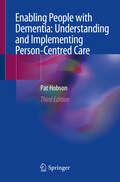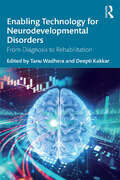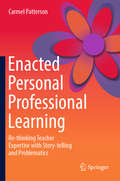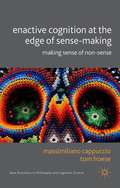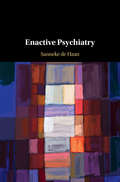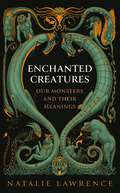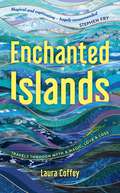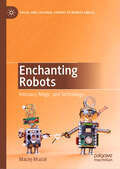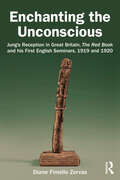- Table View
- List View
Empowerment Evaluation Principles in Practice
by David FettermanWhat principles should guide an empowerment evaluation? And how can these principles actually be put into practice? One of the primary tasks in an empowerment evaluation (EE) is to increase the capacity of program stakeholders to plan, implement, and evaluate their own programs. This book presents the most current formulation of the 10 principles of EE and provides professionals and students with the tools to put these principles into practice. Through case studies of diverse evaluation projects--including community health foundation initiatives, school district programs, and a $15 million corporate program aimed at bridging the digital divide--the founder and leading proponents of EE clarify key concepts and discuss important lessons learned. Coverage includes how to balance program improvement efforts with accountability requirements; how EE can be used to guide standards-based work; how to use EE in a learning organization; the differences among empowerment, collaborative, and participatory evaluation; and much more.
Empowerment and Participatory Evaluation of Community Interventions: Multiple Benefits
by Gary Harper Yolanda Suarez-BalcazarProgram evaluations are more relevant when conducted by the people directly involved in the programs and members of the communities they serve. Learn how empowerment and participatory evaluation can help community programs deliver more effective services! With this book, you&’ll examine theoretical models, empirical investigations, and case studies that highlight important aspects of empowerment and participatory evaluation in community programs. The first half of the book presents frameworks and tools for empowerment and participatory evaluation, with an emphasis on transferring skills and building capacity. The remaining chapters examine specific efforts to implement empowerment and participatory evaluation with a range of stakeholders, highlighting the ways in which community members collaborated with evaluators and were actively engaged in the evaluation process. Covering various types of evaluations across a range of urgent social issues, this book offers practical steps for implementing evaluations and presents theoretical models as well as applied examples. The issues that Empowerment and Participatory Evaluation of Community Interventions addresses include: challenges faced by community-based organizations in conducting evaluations of their initiatives-and solutions to those challenges, including the creation and implementation of an appropriate outcomes model ways to build capacity for participatory evaluation within community initiatives ways to promote the success and accountability of community programs how collaborative process evaluation can improve HIV prevention services evaluation techniques that illustrate the benefits of a collaborative approach-with a case study of the Conflict Resolution in Schools Programs a pilot study in which empowerment evaluation principles are used to evaluate the American Red Cross of Greater Chicago&’s Youth Leadership Training Series (a program designed to train youth volunteers) Presenting important information on program evaluation, community-based interventions and community empowerment, empowerment/participatory evaluation, community psychology, collaborative partnerships, program improvement, utilization-focused evaluation, consultation, and more, Empowerment and Participatory Evaluation of Community Interventions is a resource that everyone involved in community psychology should have!
Emptiness: Feeling Christian in America
by John CorriganFor many Christians in America, becoming filled with Christ first requires being empty of themselves a quality often overlooked in religious histories. In "Emptiness," John Corrigan highlights for the first time the various ways that American Christianity has systematically promoted the cultivation of this feeling. Corrigan examines different kinds of emptiness essential to American Christianity, such as the emptiness of deep longing, the emptying of the body through fasting or weeping, the emptiness of the wilderness, and the emptiness of historical time itself. He argues, furthermore, that emptiness is closely connected to the ways Christian groups differentiate themselves: many groups foster a sense of belonging not through affirmation, but rather avowal of what they and their doctrines are not. Through emptiness, American Christians are able to assert their identities as members of a religious community. Drawing much-needed attention to a crucial aspect of American Christianity, "Emptiness" expands our understanding of historical and contemporary Christian practices. "
Empty Arms
by Pam VredeveltThey are the most dreaded words an expectant mother can hear. As joy and anticipation dissolve into confusion and grief, painful questions refuse to go away: Why me? What did I do wrong? Doesn't God care? With the warmth and compassion of a licensed counselor and a Christian woman who has suffered miscarriage herself, Pam Vredevelt offers sound answers, advice, and reassurance to the woman fighting to maintain faith in this heartbreaking situation. Now in a fresh, contemporary cover, Empty Arms: Emotional Support for Those Who Have Suffered a Miscarriage, Stillbirth, or Tubal Pregnancy is the essential guidebook through the agony of losing a child.From the Trade Paperback edition.
Empty Promises: And Other True Cases (Ann Rule's Crime Files #7)
by Ann RuleMORE THAN 20 MILLION COPIES OFANN RULE'S BOOKS IN PRINT! In this unnerving collection drawn from her personal crime files, "America's best true-crime writer" (Kirkus Reviews) Ann Rule brilliantly dissects the convoluted love affairs that all too often end in violence. Expertly analyzing a shocking, headline-making case, Rule unmasks the deadly motives inside a seemingly idyllic marriage: a beautiful young wife, a rising star in America's top-ranked computer corporation, and a prosperous husband, the scion of a family building business. With an adorable son and a gorgeous home, the couple seemed to have it all. But a furtive evil permeated their days and nights, dragging them into a murky world of drugs, sordid sex, and con operations. In this realm, one of them would prove to be a virtual innocent, the other a manipulator with no conscience. Sudden, violent death brought their charade of a fairy-tale romance to a tragic end -- with a brutal crime that might never have come to light were it not for the stubborn detectives and prosecutors whose fight for justice spanned an entire decade. Empty Promises recounts several other cases where the search for love brought only lies and betrayal -- a cautionary primer, perhaps, for those who trust too much too soon. Powerful because they strike so close to home, the cases in Empty Promises will leave readers shaken by the realities of love gone terribly -- and fatally -- wrong.
Empty: A Memoir
by Susan BurtonAn editor at This American Life reveals the searing story of the secret binge-eating that dominated her adolescence and shapes her still.&“A smart, brave gift to the world. Bravo!&”—Mary Karr, author of The Art of Memoir and The Liar&’s ClubFor almost thirty years, Susan Burton hid her obsession with food and the secret life of compulsive eating and starving that dominated her adolescence. This is the relentlessly honest, fiercely intelligent story of living with both anorexia and binge-eating disorder, moving past her shame, and learning to tell her secret. When Burton was thirteen, her stable life in suburban Michigan was turned upside down by her parents&’ abrupt divorce, and she moved to Colorado with her mother and sister. She seized on this move west as an adventure and an opportunity to reinvent herself from middle-school nerd to popular teenage girl. But in the fallout from her parents&’ breakup, an inherited fixation on thinness went from &“peculiarity to pathology.&” Susan entered into a painful cycle of anorexia and binge eating that formed a subterranean layer to her sunny life. She went from success to success—she went to Yale, scored a dream job at a magazine right out of college, and married her college boyfriend. But in college the compulsive eating got worse—she&’d binge, swear it would be the last time, and then, hours later, do it again—and after she graduated she descended into anorexia, her attempt to &“quit food.&” Binge eating is more prevalent than anorexia or bulimia, but there is less research and little storytelling to help us understand it. In tart, soulful prose Susan Burton strikes a blow for the importance of this kind of narrative and tells an exhilarating story of longing, compulsion and hard-earned self-revelation.
Emptying Beds: The Work of an Emergency Psychiatric Unit
by Lorna A. RhodesThe work of inner-city emergency psychiatric units might best be described as "medicine under siege." Emptying Beds is the result of the author's two-year immersion in one such unit and its work. It is an account of the strategies developed by a staff of psychiatrists, social workers, nurses, and other mental health workers to deal with the dilemmas they face every day.
Empático: Guía paso a paso para superar miedos y desarrollar el don de personas altamente sensibles
by Jane Orloff• ¿Eres el tipo de persona que prefiere quedarse en casa ya que sabes que aventurarte al exterior con un gran número gente puede dejarte emocionalmente desahuciado? • ¿Te has sentido incomprendido por tus amigos, familiares y demás personas, los cuales te acusan de ser muy sensible? • ¿Tienes la habilidad de comunicarte con los animales y la mayoría de estos te dejan pasar tus dedos a través de su pelaje e inclusive darles un beso como muestra de amor? Puede ser que seas un empático. Ser una persona empática es una capacidad que ha marcado tu vida, haciéndote resaltar sobre las demás personas. Las personas pueden decir que hay algo de extraño y particular en ti, pero no saben lo que realmente es. Este libro ha sido escrito por una persona como tú. Aquí podrás ver las cualidades de un empático y las diferentes recomendaciones y consejos que puedes implementar para protegerte de los vampiros ladrones de energía Algunos de los ejercicios incluyen: • Ver por ti mismo primero • Aprender a poner límites • Dejar ir • Procesar tus emociones • Celebrar tus logros Este libro te abrirá al hecho de que tu don es envidiable y te enseñará a como tomar control de él.
En busca de la autoestima perdida
by Aquilino Polaino LorenteAl hombre contemporáneo, prisionero en la ignorancia de sí -también en lo que se refiere a la autoestima-, le es muy fácil extraviarse en el camino de la vida. Abrumado por la masa ingente de información que recibe, por el fastidio de tantas idas y venidas al encuentro de numerosos prejuicios para su inteligencia, es lógico que se encuentre fatigado. Desde luego que quiere ser él mismo y, sin embargo, es apenas un prisionero ofuscado en su desorientación vital. Conoce muchas cosas, pero tal vez ignore la que es más importante y principal: su propia persona. Acaso llega a encontrarse con otras personas al calor de un diálogo que les une y les lleva a compartir la intimidad pero, al mismo tiempo, no es capaz de encontrarse consigo mismo, tal vez porque su persona sea una perfecta desconocida. Estas circunstancias hacen que no tenga nada de extraño que la mayoría de las personas vaya en busca de la autoestima perdida. (Del prólogo de José Pedro MANGLANO).
En el culo del mundo
by António Lobo AntunesEn el culo del mundo nos abre la posibilidad de conocer la primera etapa narrativa de António Lobo Antunes y ofrece un retrato en sepia de la brutalidad de la guerra colonial de Portugal y sus consecuencias psicológicas. A lo largo del diálogo entre un hombre y una mujer, del que sólo escuchamos la voz masculina, la experiencia vivida por el protagonista en la guerra de Angola se va filtrando y expandiendo hasta absorber y condicionar todas las facetas de la relación que ambos intentan establecer. Como telón de fondo, entre brumas, encontramos la presencia de un Portugal del que Lisboa es síntesis y metáfora. Un extraordinario texto literario de implacable andadura discursiva.Traducción de Mario Merlino.
En el limbo: Aprendé a diseñar tus emociones para convertirte en quien siempre quisiste ser
by Estanislao BachrachCon Ágilmente Estanislao Bachrach puso de moda la neurociencia. Con En el limbo -luego de años de investigación- el divulgador científico más lúcido de la década nos presenta una nueva teoría sobre las emociones que barre por completo con los viejos conceptos que aún hoy intentan imponer los ensayos de autores que repiten viejas fórmulas. Este libro te va a acompañar al limbus, al límite, al borde de tu zona de confort. Porque vos podés convertirte en la persona que siempre quisiste ser. Sin duda son las emociones las que hacen que vivir valga la pena. Todos atravesamos diversos estados emocionales a lo largo de la vida y muchas veces sentimos que nos dominan. No solo no los podés evitar sino que son fundamentales a la hora de tomar decisiones. Tanto si querés ser un líder o una mejor persona, es clave que conozcas, entiendas y regules tus emociones. Sin embargo, te han enseñado muy poco sobre ellas. Pero aquí la gran noticia: si bien experimentás emociones sin esfuerzo consciente, eso no significa que seas un receptor pasivo de estas experiencias. A pesar de tu historia las podés rediseñar empleando tus pensamientos, modificando el contexto y conociendo cada vez mejor tu cuerpo. Tus emociones te aportan información sobre tu bienestar. Son datos, no direcciones. En el limbo es una herramienta esencial de autoconocimiento científico para que aprendas a utilizar tus emociones en beneficio propio. Este libro te enseñará que cualquier habilidad puede ser desarrollada. Es importante que dejes de negar u omitir una emoción y que te preguntes qué es lo que está tratando de decirte. Vos sos el dueño de tus emociones, podés diseñarlas y así diseñar tu propia vida.
En paz con la comida: Cómo me liberé de mis trastornos alimentarios y cómo tú también puedes hacerlo
by Jenni Schaefer Thom Rutledge"El libro que tienes en tus manos es probablemente la mejor guía para la superación de la anorexia escrita por una ex paciente. Y es, sobre todo, una historia de éxito." Rafael Santandreu, autor del bestseller Sin miedo Jenni llevaba mucho tiempo conviviendo con su trastorno alimentario; un trastorno que distorsionaba la percepción de su propia imagen y le provocarle secuelas físicas. Sin embargo, gracias a la terapia descrita en este libro Jenni empezó a comprender sus trastornos alimentarios como una relación tóxica y a percibirlos como una entidad distinta de sí misma. Así pudo romper con esa relación devastadora para siempre. En paz con la comida es un libro inspirador, compasivo, acompañado de numerosos ejercicios prácticos que ayudarán al lector a romper con su personal trastorno. Un libro que proporciona esperanza a millones de personas con desórdenes alimentarios, combinando la perspectiva y experiencias de una paciente con los consejos del terapeuta para alcanzar una vida más sana.
En sólo 20 horas. Aprende lo que quieras de forma rápida: Aprende lo que quieras de forma rápida
by Josh Kaufman"Algún día cuando tenga tiempo lo haré" ¿Lo has dicho? Aprende a usar tu tiempo.Sacude tu lista de pendientes y obtén las herramientas para desarrollar tu destreza en tiempo record. En sólo 20 horas ofrece un enfoque sistemático para la rápida adquisición de habilidades: cómo aprender cualquier habilidad nueva lo antes posible. Su método muestra cómo simplificar habilidades complejas, maximizar la práctica productiva, y eliminar las barreras de aprendizaje. Con tan sólo 20 horas de práctica enfocada y constante, irás de saber absolutamente nada a realizar algo notablemente bien.Este método no es teórico: es probado sobre el terreno. Josh Kaufman invita a los lectores a poner en práctica el método #ya sea para aprender programación, practicar algún deporte, tocar un instrumento, estudiar un nuevo idioma, o conocer el juego de mesa más antiguo y más complejo del mundo. Y tú, ¿Qué quieres aprender hoy?
Enabling Communication in Children with Autism
by Christopher Whittaker Carol PotterAddressing the complex issue of what constitutes a communication enabling environment for children with autism who use little or no speech, Potter and Whittaker show that the communication of these children can be significantly affected by a range of social and environmental influences. As well as providing an overview of the theoretical issues involved, Enabling Communication in Children with Autism provides detailed practical advice. Key elements of the recommended approach include * the use of minimal speech * proximal communication * the use of appropriate systems of communication including multipointing * providing many and varied opportunities for communication. Arguing that encouraging spontaneous communication should be viewed as a major educational goal for these children, Potter and Whittaker demonstrate that these children can and do communicate in enabling environments and provide practical, proven strategies for creating such environments.
Enabling Discovery, Development, and Translation of Treatments for Cognitive Dysfunction in Depression: Workshop Summary
by Lisa BainMajor depressive disorder (MDD) is recognized worldwide as a major cause of disability, morbidity, and mortality. According to the World Health Organization, unipolar depressive disorders affect more than 150 million people around the world and represent the leading cause of years lost due to disability among both men and women. In the United States alone, nearly 8 percent of persons over the age of 12 report current depression. MDD has long been defined primarily as a mood disorder. However,more recently people have begun to recognize effects on cognition as a major contributor to the disablement that accompanies depression and to consider this an underrecognized treatment target for depression. To explore how best to enable the discovery, development, and translation of treatments for cognitive dysfunction in depression, including a focus on the regulatory path forward, the Institute of Medicine's Forum on Neuroscience and Nervous Disorders convened key stakeholders at a workshop in February 2015. This report summarizes the presentations from expert speakers and discussions among workshop participants.
Enabling Mathematics Learning of Struggling Students (Research in Mathematics Education)
by Yan Ping Xin Ron Tzur Helen ThoulessThis book provides prospective and practicing teachers with research insights into the mathematical difficulties of students with learning disabilities and classroom practices that address these difficulties. This linkage between research and practice celebrates teachers as learners of their own students’ mathematical thinking, thus contributing an alternative view of mathematical progression in which students are taught conceptually. The research-based volume presents a unique collaboration among researchers in special education, psychology, and mathematics education from around the world. It reflects an ongoing work by members of the International Group for the Psychology of Mathematics Education (PME) and the North American Chapter of the PME Working Groups. The authors of chapters in this book, who have been collaborating extensively over the past 7 years, are from Australia, Canada, the United Kingdom, and the United States.
Enabling People with Dementia: Understanding And Implementing Person-centred Care
by Pat HobsonThis new updated edition challenges the perceptions, beliefs and attitudes of professionals working in dementia care settings by drawing on the theory of person-centred care. It demonstrates the importance of this theory for interacting with and caring for people with dementia. It also provides an overview of the theory in relation to two other well-known theories on dementia, and stresses the need to consider the world from the perspective of people with dementia. Moreover, the book examines the importance of dementia care environments, positive interactions, meaningful activities and the concept of personhood, which are all essential to improving the health and wellbeing of people living with dementia. In closing, it underscores the need to remember that the focus of care should be on maximizing the person’s abilities, enabling them, and promoting person-centred care. Given its content and style, the book offers a resource that can be read and understood by health and social care professionals alike, as well as anyone else caring for someone with dementia, including family members and carers.
Enabling Technology for Neurodevelopmental Disorders: From Diagnosis to Rehabilitation
by Tanu WadheraThis cutting-edge volume explores how technological tools can be designed, engineered and implemented to assess and support individuals with neurodevelopmental disorders from diagnosis through to rehabilitation. Tanu Wadhera and Deepti Kakkar and their expert contributors focus on technological tools as equalizers in Neurodevelopmental disorders (NDDs) at every stage, the importance of demand-specific design, and how we can best engineer and deploy both invasive and non-invasive individual-centered approaches that support and connect individuals. Considering the perspectives of patients, clinicians and technologists, it explores key topics including design and evaluation of platforms for tech-tools, automated diagnosis, brain imaging techniques, tech-diagnostic frameworks with AI and machine learning, sensing technology, smart brain prosthetics, gamification, alternative communication devices, and education tools and interactive toys. Outlining future challenges for research, Enabling Technology for Neurodevelopmental Disorders is useful for scholars and professionals in psychology, technology, engineering and medicine concerned with design, development and evaluation of a range of assistive technological tools.
Enacted Personal Professional Learning: Re-thinking Teacher Expertise with Story-telling and Problematics
by Carmel PattersonThis book offers a vital new approach to teacher professional learning, drawing on teachers’ stories from the field. It investigates expert teachers’ professional learning and uses a narrative framework to analyse their meaning-making processes. The book focuses on how proficient teachers develop their expertise, emphasising that individual needs and the contextual nature of learning require a personally enacted approach. Further, it explores the stories of five secondary school teachers, nominated by their colleagues for their outstanding expertise, to present new insights into expert teachers’ views. Using a new evidence-based approach, Enacted Personal Professional Learning, it incorporates teachers’ unique perspectives, problems and thought processes in order to understand expert teachers’ learning, and offers essential principles for promoting storytelling to help teachers be or become empowered educators who can actively shape education communities for teacher professional learning.
Enactive Cognition At The Edge Of Sense-making
by Massimiliano Cappuccio Tom FroeseThe enactive approach replaces the classical computer metaphor of mind with emphasis on embodiment and social interaction as the sources of our goals and concerns. Researchers from a range of disciplines unite to address the challenge of how to account for the more uniquely human aspects of cognition, including the abstract and the nonsensical.
Enactive Psychiatry
by Sanneke de HaanPsychiatry is enormously complex. One of its main difficulties is to articulate the relationship between the wide assortment of factors that may cause or contribute to psychiatric disorders. Such factors range from traumatic experiences to dysfunctional neurotransmitters, existential worries, economic deprivation, social exclusion and genetic bad luck. The relevant factors and how they interact can differ not only between diagnoses but also between individuals with the same diagnosis. How should we understand and navigate such complexity? Enactive Psychiatry presents an integrative account of the many phenomena at play in the development and persistence of psychiatric disorders by drawing on insights from enactivism, a theory of embodied cognition. From the enactive perspective on the mind and its relation to both the body and the world, we can achieve a new understanding of the nature of psychiatric disorders and the causality involved in their development and treatment, thereby resolving psychiatry's integration problem.
Enchanted Creatures: Our Monsters and Their Meanings
by Natalie LawrenceThe hydra rears its many heads in a flurry of teeth and poisonous fumes. The cyborg lays waste to humanity with a ruthless, expressionless stare.From ancient mythology to modern science fiction, we have had to confront the monsters that lurk in the depths of our collective imagination. They embody our anxieties and our irrational terrors, giving form to what we don't wish to know or understand. For millennia, monsters have helped us to manage the extraordinary complexity of our minds and to deal with the challenges of being human.In Enchanted Creatures, Natalie Lawrence delves into 15,000 years of imaginary beasts and uncovers the other-worldly natural history that has evolved with our deepest fears and fascinations. Join Lawrence on a tour of prehistoric cave monsters, serpentine hybrids, deep-sea leviathans and fire-breathing Kaiju. Discover how this monstrous menagerie has shaped our minds, our societies and how we see our place in nature.
Enchanted Islands: A Mediterranean Odyssey – A Memoir of Travels through Love, Grief and Mythology
by Laura CoffeyEnchanted Islands tells the true story of Laura Coffey's epic journey around the mystical archipelagos of the Mediterranean. Blending memoir, travel and nature writing with tales from The Odyssey, and infused with sharply comic wit, this is a celebration of the redemptive powers of cold-water swimming and luminous star-lit skies.
Enchanting Robots: Intimacy, Magic, and Technology (Social and Cultural Studies of Robots and AI)
by Maciej MusiałThis book argues that robots are enchanting humans (as potential intimate partners), because humans are enchanting robots (by performing magical thinking), and that these processes are a part of a significant re-enchantment of the “modern” world. As a foundation, the author examines arguments for and against intimate relationships with robots, particularly sex robots and care robots. Moreover, the book provides a consideration of human-robot interactions and philosophical reflections about robots through the lens of magic and magical thinking as well as theoretical and practical re-evaluations of their status and presence. Furthermore, the author discusses the abovementioned issues in the context of disenchantment and re-enchantment of the world, characterizing modernity as a coexistence of these two processes. The book closes with a consideration of future scenarios regarding the meaning of life in the age of rampant automation and the possibility that designing robots becomes a sort of new eugenics as a consequence of recognizing robots as persons.
Enchanting the Unconscious: Jung’s Reception in Great Britain, The Red Book and his First English Seminars, 1919 and 1920
by Diane Finiello ZervasThis original volume explores Jung’s earliest English seminars, held in 1919 and 1920, in relation to the impact of Liber Novus and The Red Book and his new exoteric and esoteric concepts of analytical psychology created during the Great War.The groundbreaking seminars presented in the book yield important insights about Jung’s application of analytical methods and the psychological concepts he developed in response to his confrontation with the unconscious, recorded in Liber Novus and in his Collected Papers on Analytical Psychology, edited by Dr. Constance Long, one of his first English analysands and colleagues. The English seminars illuminate the extent to which Jung shared, or alluded to, material from Liber Novus and The Red Book, supported by evidence from Long’s journal which contains a wealth of additional material about Jung’s method of supervision, views on transference, her own analysis and the eventual break-up of the London group.Enchanting the Unconscious is an important and timeless contribution to Jungian history and our understanding of early formulations of Jung’s conceptual model of the psyche, making it of great interest to Jungian analysts, analytical psychologists, students of Jungian history and general readers interested in exploring Jung’s earliest teaching seminars previously undocumented or distorted by hearsay.
